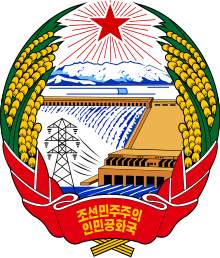State Security Department
| 국가안전보위부 | |
 |
|
| Agency overview | |
|---|---|
| Formed | 1973 |
| Jurisdiction | Government of North Korea |
| State Security Department | |
| Chosŏn'gŭl | 국가안전보위부 |
|---|---|
| Hancha | |
| Revised Romanization | Gukga anjeon bowibu |
| McCune–Reischauer | Kukka anjŏn powibu |
The State Security Department of North Korea or the Ministry of State Security is the secret police agency of North Korea. It is an autonomous agency of the North Korean government reporting directly to the Supreme Leader. It was established in 1973. In addition to its internal security duties, it is involved in the operation of North Korea's concentration camps and various other hidden activities. It is reputed to be one of the most brutal police forces in the world, and has been involved in numerous human rights abuses.
It is one of two agencies which provides security or protection to North Korean officials and VIPs alongside the Supreme Guard Command.
Some defectors and sources have suggested that unlike its Eastern Bloc Counterparts, State Security functions are actually conducted by several larger and different security bodies that operate under the Party or the Army, each with its own unique responsibilities and classified names that are referred to by code (i.e. Room 39), and that the Agency is little more than a hollow shell used by the elite to coordinate their activities and provide cover for them.
The post of Security Department head was left vacant after Minister Ri Chun-su's death in 1987, although it was de facto if not de jure controlled by Kim Jong-il and the WPK Organization and Guidance Department he headed. In 1998, the SSD migrated under the National Defence Commission, also chaired by Kim Jong-il. Finally, in 2007, it was transferred under the WPK Administration Department, whose first vice director became responsible of the SSD daily work, but it continued to have obligations towards the Organization and Guidance Department.
In November 2011, it was reported that General U Tong-chuk had been appointed permanent minister of State Security, the first of this kind since 1987, filling a post left unoccupied for 24 years. This was almost concurrent with General Ri Myong-su's appointment as minister of People's Security. Other sources also claimed that Kim Jong-un worked at the State Security Department before and/or after his anointment as heir apparent in September 2010.Kim Won-hong was appointed minister in April 2012 as the position was restored following Kim Jong-il's death.
...
Wikipedia
